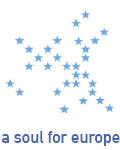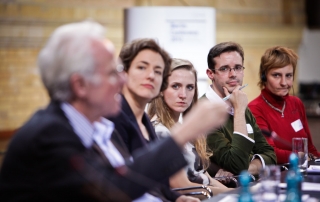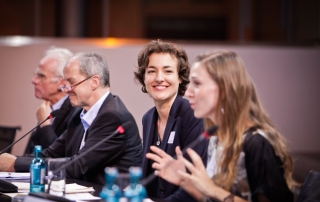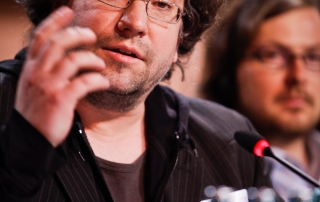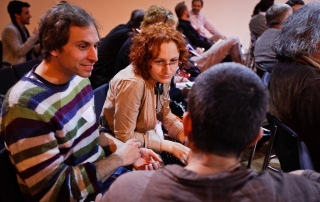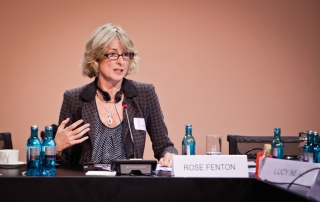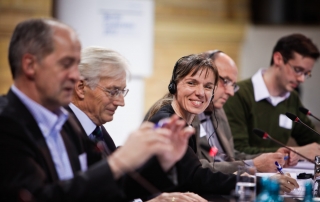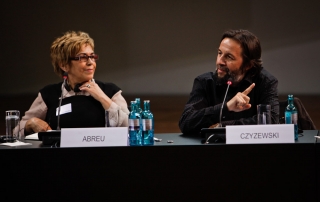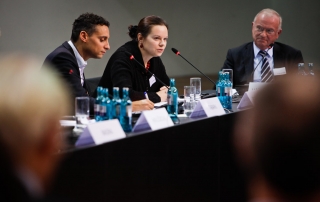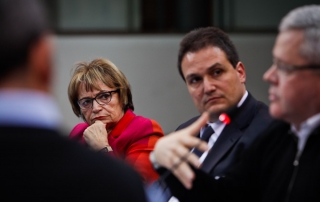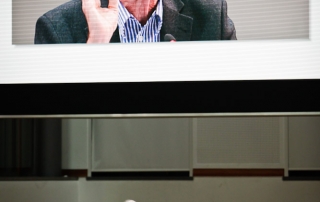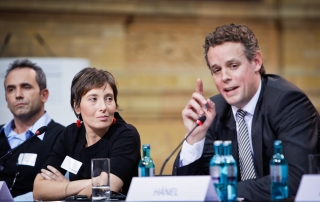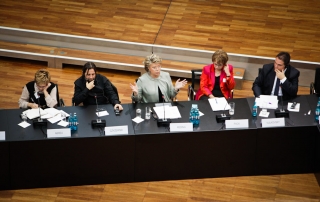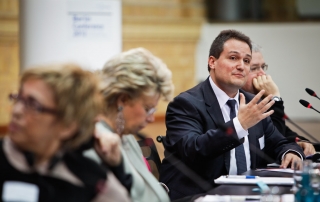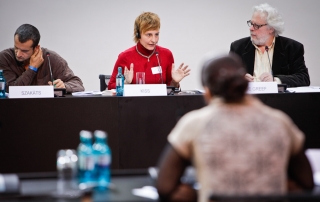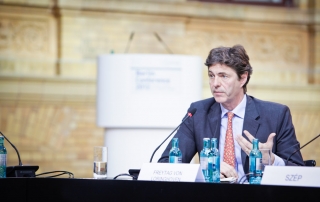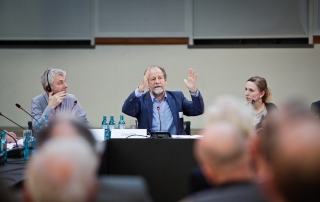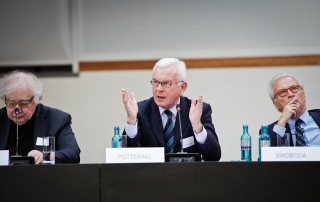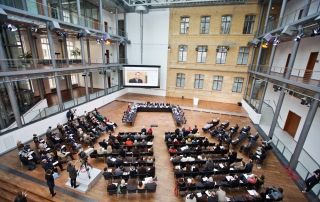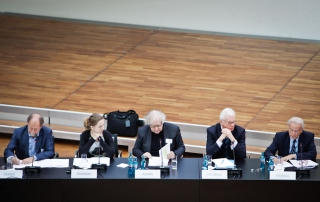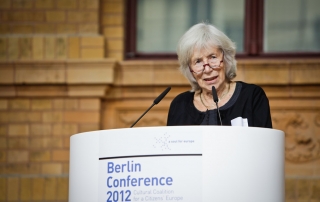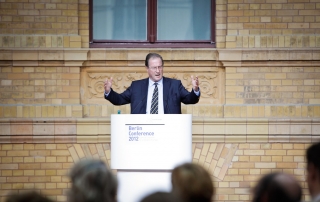Project Description
Berlin Conference 2012
It is time to develop and present ideas and models of action. Europe means citizens.
Berlin Conference 2012
It is time to develop and present ideas and models of action. Europe means citizens.
This year’s Berlin Conference with the title “Cultural Coalition for a Citizens’ Europe” took place on 10 November 2012 at the Deutsche Telekom, Berlin Representative Office. The fifth Berlin Conference was based on the conviction that it is the citizens who have to shape Europe, and that they should do so by using “culture” as a tool. The aim was to think of new ways and ideas how to make use of this tool and how to motivate the citizens to take on responsibility and to build a “cultural coalition”.
In three discussion panels, the role of the citizens, the EU and culture were discussed from different perspectives with participants from a wide range of areas, including business, politics, as well as the arts and culture. The three discussion rounds focussed on:
- Democracies at Risk
- Cities, Citizens, and their Responsibilities
- Environmental Challenges: Cultural Approaches
In the first panel, diverse solutions for the crisis within Europe were discussed. It became clear that both democracy and citizenship are endangered by the crisis. Europe has to be brought closer to the people through dialogue and tangible projects, which would in turn also affect democracies within Europe. The conclusion of the panel was that citizens are carriers of culture, and therefore carriers of democracy.
The responsibilities of citizens and cities were discussed in the second conference session. Politicians and institutions have to take citizens more seriously and have to make sure that their voices are heard. It is the citizens who should “carry” the politicians, and not the other way around – an idea that still has to be communicated and put into practice. New methods have to be introduced to achieve this aim and more funding would be needed to create real long-term change.
In the third panel of the day, the participants discussed possible cultural approaches on environmental issues. Culture should be used as a tool to make people more aware of climate change, for example by its power to create new narratives, but also by creating a platform on which issues can be addressed. On the other side, the mobility of artists also affects the environment, which is a problem that will have to be dealt with and where solutions need to be found.
The conference concluded with an outlook on 2014, when the biannual Berlin Conference reaches a new level: 100 years after the outbreak of WWI, the European Parliament, “A Soul for Europe” as well as artists and intellectuals will together take responsibility for the Berlin Conference and make it the platform to discuss how Europe can contribute to address present-day challenges.
Among the political representatives participating in the conference were Viviane Reding, Commissioner for Justice, Fundamental Rights and Citizenship and the MEPs Michael Cramer, Jo Leinen, Doris Pack, Hans-Gert Pöttering, and Hannes Swoboda. Also, Krzysztof Czyzewski, Artistic Director of Wroclaw 2016, the Hungarian author Noémi Kiss, and Francisca Abreu, Culture Councilor to the city of Guimarães were among the many participants.
You can find the call to join the coalition, the conference programme and a collection of statements on the question “What holds Europe together in the core?” here.
Also, at this year’s Berlin Conference, the photography, research and debate project “Warriors–Generation–Europe” was presented. This project by artist Paul Hoßfeld was awarded the Council of Europe’s “Cultural Event” label. It addresses the first truly “European” generation, aiming to discuss and reflect European culture, society and identity. The exhibition will travel around Europe from 2013 onwards, starting in Strasbourg in May 2013. For further information please visit their website.
The Berlin Conference was preceded by the conference, “Cities for Europe”, dealing with the responsibilities of cities to engage and motivate their citizens in European projects. For more information please click here. The Berlin Conference is part of a series of three events dedicated to a Europe from the bottom-up under the title of “Cultural Coalition for a Citizens’ Europe”. It was followed by the Brussels Conversations 2012 by the partners of the European House for Culture on 16-18 November, and the Genootschap Felix Meritis/Felix Meritis Foundation‘s Amsterdam Conversation 2012 on 30 November.
Gallery
“A Soul for Europe” would like to thank the following partners for their support:
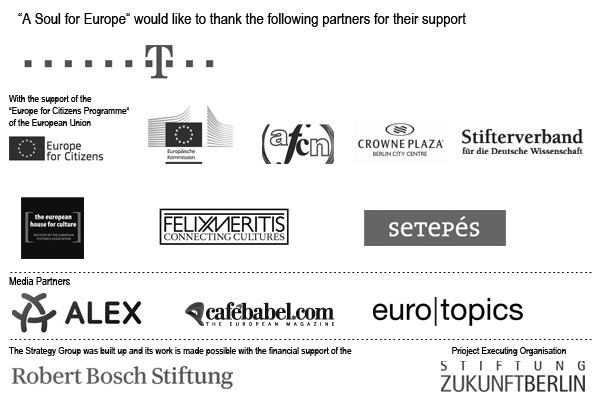
This year’s Berlin Conference with the title “Cultural Coalition for a Citizens’ Europe” took place on 10 November 2012 at the Deutsche Telekom, Berlin Representative Office. The fifth Berlin Conference was based on the conviction that it is the citizens who have to shape Europe, and that they should do so by using “culture” as a tool. The aim was to think of new ways and ideas how to make use of this tool and how to motivate the citizens to take on responsibility and to build a “cultural coalition”.
In three discussion panels, the role of the citizens, the EU and culture were discussed from different perspectives with participants from a wide range of areas, including business, politics, as well as the arts and culture. The three discussion rounds focussed on:
- Democracies at Risk
- Cities, Citizens, and their Responsibilities
- Environmental Challenges: Cultural Approaches
In the first panel, diverse solutions for the crisis within Europe were discussed. It became clear that both democracy and citizenship are endangered by the crisis. Europe has to be brought closer to the people through dialogue and tangible projects, which would in turn also affect democracies within Europe. The conclusion of the panel was that citizens are carriers of culture, and therefore carriers of democracy.
The responsibilities of citizens and cities were discussed in the second conference session. Politicians and institutions have to take citizens more seriously and have to make sure that their voices are heard. It is the citizens who should “carry” the politicians, and not the other way around – an idea that still has to be communicated and put into practice. New methods have to be introduced to achieve this aim and more funding would be needed to create real long-term change.
In the third panel of the day, the participants discussed possible cultural approaches on environmental issues. Culture should be used as a tool to make people more aware of climate change, for example by its power to create new narratives, but also by creating a platform on which issues can be addressed. On the other side, the mobility of artists also affects the environment, which is a problem that will have to be dealt with and where solutions need to be found.
The conference concluded with an outlook on 2014, when the biannual Berlin Conference reaches a new level: 100 years after the outbreak of WWI, the European Parliament, “A Soul for Europe” as well as artists and intellectuals will together take responsibility for the Berlin Conference and make it the platform to discuss how Europe can contribute to address present-day challenges.
Among the political representatives participating in the conference were Viviane Reding, Commissioner for Justice, Fundamental Rights and Citizenship and the MEPs Michael Cramer, Jo Leinen, Doris Pack, Hans-Gert Pöttering, and Hannes Swoboda. Also, Krzysztof Czyzewski, Artistic Director of Wroclaw 2016, the Hungarian author Noémi Kiss, and Francisca Abreu, Culture Councilor to the city of Guimarães were among the many participants.
You can find the call to join the coalition, the conference programme and a collection of statements on the question “What holds Europe together in the core?” here.
Also, at this year’s Berlin Conference, the photography, research and debate project “Warriors–Generation–Europe” was presented. This project by artist Paul Hoßfeld was awarded the Council of Europe’s “Cultural Event” label. It addresses the first truly “European” generation, aiming to discuss and reflect European culture, society and identity. The exhibition will travel around Europe from 2013 onwards, starting in Strasbourg in May 2013. For further information please visit their website.
The Berlin Conference was preceded by the conference, “Cities for Europe”, dealing with the responsibilities of cities to engage and motivate their citizens in European projects. For more information please click here. The Berlin Conference is part of a series of three events dedicated to a Europe from the bottom-up under the title of “Cultural Coalition for a Citizens’ Europe”. It was followed by the Brussels Conversations 2012 by the partners of the European House for Culture on 16-18 November, and the Genootschap Felix Meritis/Felix Meritis Foundation‘s Amsterdam Conversation 2012 on 30 November.
Gallery
“A Soul for Europe” would like to thank the following partners for their support:

